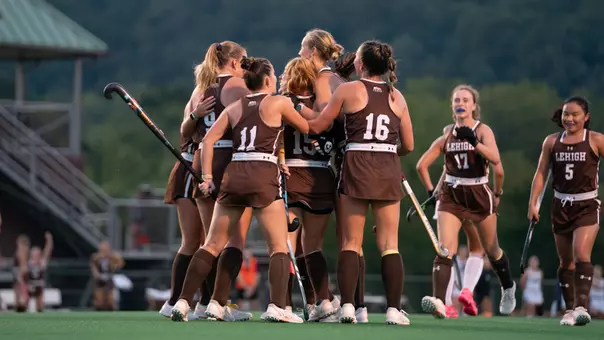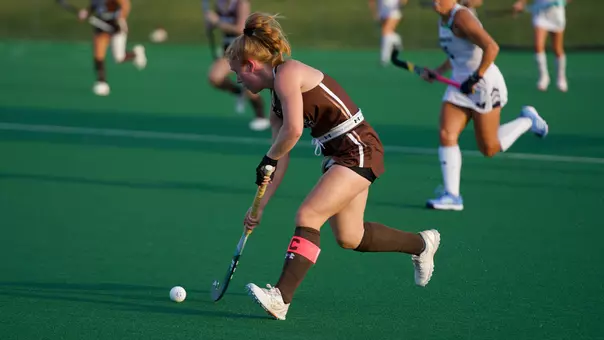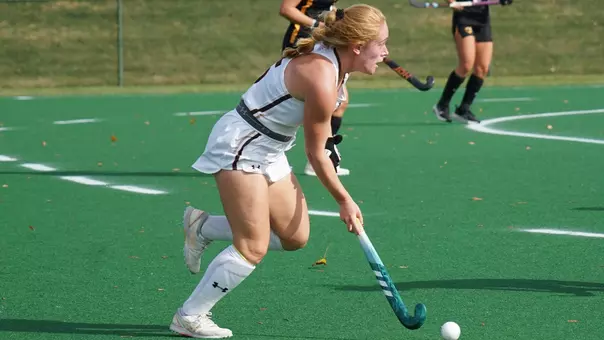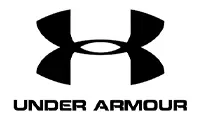Lehigh University Athletics
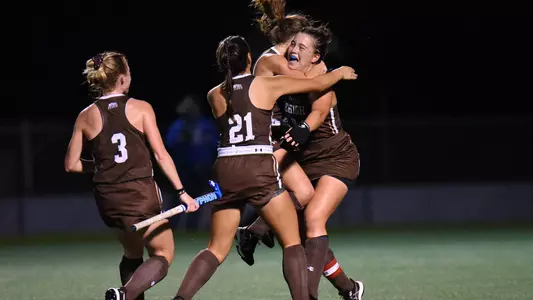
Photo by: Hannahally Photography
Patience Paying Off For Lehigh Field Hockey
11/3/2021 8:08:00 PM | Field Hockey, Student Athlete, Features
By: Justin Lafleur, Lehigh Sports Communications
When head coach Caitlin Dallmeyer came to Lehigh in 2016, she was determined to turn Lehigh field hockey into a winning program. She knew it wouldn't be easy. Patience would be a virtue.
Dallmeyer and associate head coach Taylor Dyer took a big-picture approach, rather than taking shortcuts that could compromise the long-term growth of the program.
Today, that patience is paying off.
Due in large part to normalizing certain behaviors that breed success, the Mountain Hawks enter this week's Patriot League Tournament with an 11-6 record – in the midst of the program's best season since 1994 (and one of the best seasons in program history).
"Normalizing behaviors is essentially the work that goes behind meeting team standards," said Dallmeyer. "We have fitness expectations needed to compete at a high level and endure the length of a season; there are consistent behaviors that come with meeting these expectations. The same goes for skill work, physical strength on ball, teammate relations, academic excellence and the mental part of the game.
"We can't have standards and expectations without action steps behind how to meet them."
Let's take a closer look at some of those behaviors, action steps, and how it has all positively affected the Mountain Hawks' culture.
Fitness and Fitness Expectations
Field hockey is a game that requires different types of fitness. For example, it takes endurance to play 60 minutes with practically nonstop running. The game can also feature a lot of sprinting – like getting back on defense to stop a transition opportunity.
"Each member of LUFH acknowledges the importance of having high fitness standards, and takes fitness expectations very seriously," said junior Sophie Leighton. "Although fitness development is done individually over the summer, we are consistently communicating with one another with questions, concerns and tips, and encouraging open and honest conversations. Having this team culture has not only allowed us to stay motivated throughout our training, but has also helped the first-years understand how we value fitness standards so they're able to do the same."

The first-years are coming into an environment in which the returnees truly understand and value the importance of fitness, so the expectation is they do the same.
"I personally think having baseline fitness is so important because it emphasizes that running is a privilege, not a punishment," said Leighton. "Having fitness testing allows us to celebrate our body's ability to become physically fit, and showcases the hard work that we put into training."
That hard work has paid off this season in countless moments.
"The most recognizable moment would be our overtime win over Lafayette," said Leighton. "Stringing together four fast-paced quarters against a competitive team, and then bringing the same intensity into overtime play, showcased our strong endurance."
It led to a memorable Senior Night victory.
"Overall, I think the fitness buy-in has excelled past what it was in previous years, showcased by the majority of the team passing the fitness test within the first few days of preseason, teammates prioritizing pushing others during fitness activities and finding time outside of practice to get in extra fitness work when necessary."
Getting in extra work is a common theme across all winning behaviors, and something you will hear often as you read on.
Bench Culture
Everyone within Lehigh field hockey plays a role in the Mountain Hawks' success. The coaching staff and players make a concerted effort to celebrate all contributions, tangible and intangible, in so many different areas.
One of those is bench culture.
"We try to make the bench have a really big impact on what's happening on the field, and really bring the energy," said junior Cece Slaughter.
The Mountain Hawks want to make sure the energy coming off the field is going straight onto the field and vice versa.
"Having a strong bench culture really makes the whole team feel more together," said Slaughter. "Even when you're coming off the field, you still have a role to be as loud and encouraging as you can."
Another piece of Lehigh's bench culture is constant feedback.
"Here at LUFH, we really try to make sure when people are coming off the field during a game, that we're giving helpful feedback," said Slaughter. "Field hockey is a really fast-subbing game. At some points, coaches can't take the time to talk to everyone who's coming off the field, so we try to keep accountable what we're seeing."
The Mountain Hawks are bought into the vision of creating change within LUFH, so with it has come normalizing a strong bench culture
"I don't think we'd have as strong of a bench culture if we weren't all so bought into this 'never settle' mentality," said Slaughter. "Even on the bench, you can do more than standing and watching the game.
"You are part of it and everybody has their own role in our success."
Getting in Extra Reps
Over its time at Lehigh, the senior class has seen impressive growth in the team's desire to get extra reps.
And what's the best and most exciting part?
The student-athletes are taking it upon themselves.
"Getting in extra reps has become self-motivated," said senior Leah Mullery. "Our freshmen year, the coaches had to remind everyone to set up weekly individual [sessions] to improve our skills. This year, the team has taken it upon ourselves to take extra reps, without the reminder from the coaches. The intensity level getting in extra practice has also increased. Instead of just going through the motions, we treat the extra reps as if they were a real practice or game."
Team practices only allow so much time to improve, so extra reps are paramount to growth and development.
"One of the main reasons extra reps are so important is because it gives us the opportunity to work on individual skills that need extra work," said Mullery. "If a specific skill isn't going well at practice, we aren't able to change the practice schedule until the skill is perfected. The only way to improve is to grab a teammate and practice the skill outside of the set practice times."
The overall buy-in within the Mountain Hawks has continued to improve by the year, culminating in this season (no coincidence that it's correlated with Lehigh's success).
"The current team is the most 'bought in' group that I have been a part of during my time here," said senior Sam Nason. "It's not uncommon for a teammate to invite others to get extra reps or workouts in with them. This group of players understands the importance of getting in extra reps and encourages teammates to do so as well.
"Because of this, getting in extra reps has become a normalized part of LUFH expectations and team culture."
Those extra reps lead to tangible moments on the playing field.
"One example is when Drew (Pecora) took time to get extra reps in the inserter tipping position," said Nason. "The following weekend, she ended up scoring a goal from that exact position. This is a tangible moment I can remember when getting extra reps, which directly translated into gameplay. This reflects the importance of getting in extra reps to improve our individual skills, and ultimately how our team performs.
"Getting extra reps doesn't have to be just field hockey skills," Nason continued. "We've seen many people, such as Sophie (Leighton), getting in extra runs to improve their fitness.
"It has definitely been noticed."
Open Dialogue with Coaches
Another normalized behavior surrounding LUFH has been communication – from players to coaches and coaches to players. With that transparency, there aren't any secrets, which increases buy-in from all sides.

"The coaches are very open about players' roles and expectations of people," said graduate student Lenke Havas. "On the other end, the team makes sure to be honest towards the coaches about how they're feeling. Open dialogue about improvements are happening continuously, from one-on-one conversations on the sidelines to individual film sessions.
"The reason this has improved over the past few years is there's more willingness to learn and improve from the players," Havas continued. "In addition, there is more trust between the coaching staff and team, making it possible for the coaches to have more open dialogues with everyone."
Trust can go a long way, and the players know the coaches are doing what's best for them – both individually and the team. The coaches also have trust that the players will take coaching and do all they can to improve.
"Because of the open dialogue, people knew early on what their roles were going to be this season and everyone has been very committed to being their best at these roles," said Pecora. "For some, this has meant being subbed into a game and bringing that extra spark, or playing on the scout team to make sure everyone is prepared. Others have been key in maintaining our bench and overall culture, by bringing lots of energy and supporting teammates.
"People realize that we need everyone to be bought in, regardless of their roles, and we know that everyone brings something unique to the team's success."
The reason for LUFH's growth in this area of open dialogue goes back to taking ownership of their play, and having pride to be the best versions of themselves for not only themselves, but also those around them.
"We have seen people make some really big changes from the beginning of the season to now, which stems from them taking ownership and working with the coaching staff to make improvements," said Havas. "Open dialogue allowed players to show the coaches their willingness to make changes, and you could see it pay off when adjustments showed on the field.
"Self-awareness about your areas of improvement, and then openness with the coaches on what to work on, has allowed many players to grow into their roles more and more as the season has gone on."
Consistent and Thoughtful Approach to Building Relationships
The Lehigh field hockey team loves one another like sisters. That love has made each one of them want to do their very best for her teammates.
The strong family feel has grown from a consistent and thoughtful approach to building relationships, which begins during preseason (and even before).
"The LUFH approach to relationship building is avoiding social hierarchy, so age or class does not hinder chemistry or friendships," said junior Sydney White. "Also, off the field, we are very intentional about spending time with one another and getting to know each other as more than teammates. For example, last Friday, we had a team Halloween party which is an annual festivity that everyone looks forward to."
Like all of the normalized behaviors, student-athletes taking accountability has proven critically important in building relationships.

"Team culture has always been a very important value of LUFH," said junior Sarah Bonthuis. "It's also important to Coach that everyone on the team takes accountability for building relationships with one another, not just the upperclassmen. We have definitely recognized this area of growth and feel that we've been led in a way where we feel capable of carrying on this value as seniors next year."
That's the best part about LUFH's culture… the fact that leadership has occurred in a way that demands accountability across the board, and isn't just a responsibility given to the senior class.
And that should lead to sustained success.
"Right now, we would say the team is as close as we've ever been in seasons past," said White. "There is a family feeling between everyone and a genuine commitment to helping each other be as successful as possible."
Recruiting and Connecting with the Next Generation of LUFH
Student-athletes are only at Lehigh for four (or five) years, so effectively bringing along the next class of student-athletes allows these normalized behaviors – and strong culture – to continue.
Dallmeyer, Dyer and the Mountain Hawks don't want student-athletes to come if Lehigh isn't the right fit for them, so they look to give prospective student-athletes a true feeling of the LUFH family.
"One of the best methods for connecting with the next generations of LUFH are the visits," said first-year Guusje Hogendoorn. "Whenever a recruit visits our campus, they can get the full experience of being at Lehigh. We show them around campus, take them to our classes and eat lunch with them. I would say this is exciting for not only them, but also for us as members of LUFH because this way, we get to know them a little better and build connections with a possible future teammate."
It's also an opportunity for the current players to begin the process of establishing expectations (in regards to behaviors), so if the prospective student-athlete ends up at Lehigh, she knows what to expect. By being so up-front from the beginning, it's helping normalize behaviors before student-athletes even come to Lehigh.
"I hope that from my interactions with recruits, they get a good idea of what our team culture is like," said sophomore Erica Steele. "Team culture is really important for LUFH and we want the recruits to understand all of the things we value here, such as being inclusive and having a team-first mentality.
"I also hope that through my interactions with recruits, they're able to get answers to any questions they have about Lehigh, the team or just college in general," Steele continued. "By interacting with current team members, the recruits can get a sense of a day in the life of a LUFH member and determine if they can picture themselves in the same place in the near future."
Takeaways
Lehigh field hockey is at an exciting point in time. The program's breakthrough has been a byproduct of hard work from not only the current Mountain Hawks, but also many who have graduated.
"In my first few years at Lehigh, we had a handful of really hard workers, who were willing to do whatever it took to win," said Dallmeyer. "Unfortunately, they were surrounded by a culture that did not support winning habits. It has been no easy task to break through, but that's not to say nobody before us had tried. We needed those few who have trickled through the program these last few years to be the spark.

"In observing and adjusting, this generation of LUFHers has been able to be the change by unifying together in their mission to move this program forward with no complaints around the work needing to be done to do it and 100 percent support of one another, no matter what role each person may have."
The Mountain Hawks as a program are in a strong position, but looking to get better every day. They are happy with the growth and development, but not satisfied, heading into this week's Patriot League Tournament and beyond.
"When I look at our senior class, I see several different leadership styles that all combine to support and complement each other," said Dallmeyer. "The work around culture is never ending, and when this class graduates, we will redefine our current culture, identify its strengths and weaknesses, and work to level up with the new leadership to best continue elevating the success of the program."

When head coach Caitlin Dallmeyer came to Lehigh in 2016, she was determined to turn Lehigh field hockey into a winning program. She knew it wouldn't be easy. Patience would be a virtue.
Dallmeyer and associate head coach Taylor Dyer took a big-picture approach, rather than taking shortcuts that could compromise the long-term growth of the program.
Today, that patience is paying off.
Due in large part to normalizing certain behaviors that breed success, the Mountain Hawks enter this week's Patriot League Tournament with an 11-6 record – in the midst of the program's best season since 1994 (and one of the best seasons in program history).
"Normalizing behaviors is essentially the work that goes behind meeting team standards," said Dallmeyer. "We have fitness expectations needed to compete at a high level and endure the length of a season; there are consistent behaviors that come with meeting these expectations. The same goes for skill work, physical strength on ball, teammate relations, academic excellence and the mental part of the game.
"We can't have standards and expectations without action steps behind how to meet them."
Let's take a closer look at some of those behaviors, action steps, and how it has all positively affected the Mountain Hawks' culture.
Fitness and Fitness Expectations
Field hockey is a game that requires different types of fitness. For example, it takes endurance to play 60 minutes with practically nonstop running. The game can also feature a lot of sprinting – like getting back on defense to stop a transition opportunity.
"Each member of LUFH acknowledges the importance of having high fitness standards, and takes fitness expectations very seriously," said junior Sophie Leighton. "Although fitness development is done individually over the summer, we are consistently communicating with one another with questions, concerns and tips, and encouraging open and honest conversations. Having this team culture has not only allowed us to stay motivated throughout our training, but has also helped the first-years understand how we value fitness standards so they're able to do the same."

The first-years are coming into an environment in which the returnees truly understand and value the importance of fitness, so the expectation is they do the same.
"I personally think having baseline fitness is so important because it emphasizes that running is a privilege, not a punishment," said Leighton. "Having fitness testing allows us to celebrate our body's ability to become physically fit, and showcases the hard work that we put into training."
That hard work has paid off this season in countless moments.
"The most recognizable moment would be our overtime win over Lafayette," said Leighton. "Stringing together four fast-paced quarters against a competitive team, and then bringing the same intensity into overtime play, showcased our strong endurance."
It led to a memorable Senior Night victory.
"Overall, I think the fitness buy-in has excelled past what it was in previous years, showcased by the majority of the team passing the fitness test within the first few days of preseason, teammates prioritizing pushing others during fitness activities and finding time outside of practice to get in extra fitness work when necessary."
Getting in extra work is a common theme across all winning behaviors, and something you will hear often as you read on.
Bench Culture
Everyone within Lehigh field hockey plays a role in the Mountain Hawks' success. The coaching staff and players make a concerted effort to celebrate all contributions, tangible and intangible, in so many different areas.
One of those is bench culture.
"We try to make the bench have a really big impact on what's happening on the field, and really bring the energy," said junior Cece Slaughter.
The Mountain Hawks want to make sure the energy coming off the field is going straight onto the field and vice versa.
"Having a strong bench culture really makes the whole team feel more together," said Slaughter. "Even when you're coming off the field, you still have a role to be as loud and encouraging as you can."
Another piece of Lehigh's bench culture is constant feedback.
"Here at LUFH, we really try to make sure when people are coming off the field during a game, that we're giving helpful feedback," said Slaughter. "Field hockey is a really fast-subbing game. At some points, coaches can't take the time to talk to everyone who's coming off the field, so we try to keep accountable what we're seeing."
The Mountain Hawks are bought into the vision of creating change within LUFH, so with it has come normalizing a strong bench culture
"I don't think we'd have as strong of a bench culture if we weren't all so bought into this 'never settle' mentality," said Slaughter. "Even on the bench, you can do more than standing and watching the game.
"You are part of it and everybody has their own role in our success."
There are so many aspects of @LehighFH's culture that have played a big role in the Mountain Hawks' success. One is LUFH's bench culture... Learn more in this video feature! pic.twitter.com/Ii0dgqx36x
— Lehigh Field Hockey (@LehighFH) November 2, 2021
Getting in Extra Reps
Over its time at Lehigh, the senior class has seen impressive growth in the team's desire to get extra reps.
And what's the best and most exciting part?
The student-athletes are taking it upon themselves.
"Getting in extra reps has become self-motivated," said senior Leah Mullery. "Our freshmen year, the coaches had to remind everyone to set up weekly individual [sessions] to improve our skills. This year, the team has taken it upon ourselves to take extra reps, without the reminder from the coaches. The intensity level getting in extra practice has also increased. Instead of just going through the motions, we treat the extra reps as if they were a real practice or game."
Team practices only allow so much time to improve, so extra reps are paramount to growth and development.
"One of the main reasons extra reps are so important is because it gives us the opportunity to work on individual skills that need extra work," said Mullery. "If a specific skill isn't going well at practice, we aren't able to change the practice schedule until the skill is perfected. The only way to improve is to grab a teammate and practice the skill outside of the set practice times."
The overall buy-in within the Mountain Hawks has continued to improve by the year, culminating in this season (no coincidence that it's correlated with Lehigh's success).
"The current team is the most 'bought in' group that I have been a part of during my time here," said senior Sam Nason. "It's not uncommon for a teammate to invite others to get extra reps or workouts in with them. This group of players understands the importance of getting in extra reps and encourages teammates to do so as well.
"Because of this, getting in extra reps has become a normalized part of LUFH expectations and team culture."
Those extra reps lead to tangible moments on the playing field.
"One example is when Drew (Pecora) took time to get extra reps in the inserter tipping position," said Nason. "The following weekend, she ended up scoring a goal from that exact position. This is a tangible moment I can remember when getting extra reps, which directly translated into gameplay. This reflects the importance of getting in extra reps to improve our individual skills, and ultimately how our team performs.
"Getting extra reps doesn't have to be just field hockey skills," Nason continued. "We've seen many people, such as Sophie (Leighton), getting in extra runs to improve their fitness.
"It has definitely been noticed."
Open Dialogue with Coaches
Another normalized behavior surrounding LUFH has been communication – from players to coaches and coaches to players. With that transparency, there aren't any secrets, which increases buy-in from all sides.

"The coaches are very open about players' roles and expectations of people," said graduate student Lenke Havas. "On the other end, the team makes sure to be honest towards the coaches about how they're feeling. Open dialogue about improvements are happening continuously, from one-on-one conversations on the sidelines to individual film sessions.
"The reason this has improved over the past few years is there's more willingness to learn and improve from the players," Havas continued. "In addition, there is more trust between the coaching staff and team, making it possible for the coaches to have more open dialogues with everyone."
Trust can go a long way, and the players know the coaches are doing what's best for them – both individually and the team. The coaches also have trust that the players will take coaching and do all they can to improve.
"Because of the open dialogue, people knew early on what their roles were going to be this season and everyone has been very committed to being their best at these roles," said Pecora. "For some, this has meant being subbed into a game and bringing that extra spark, or playing on the scout team to make sure everyone is prepared. Others have been key in maintaining our bench and overall culture, by bringing lots of energy and supporting teammates.
"People realize that we need everyone to be bought in, regardless of their roles, and we know that everyone brings something unique to the team's success."
The reason for LUFH's growth in this area of open dialogue goes back to taking ownership of their play, and having pride to be the best versions of themselves for not only themselves, but also those around them.
"We have seen people make some really big changes from the beginning of the season to now, which stems from them taking ownership and working with the coaching staff to make improvements," said Havas. "Open dialogue allowed players to show the coaches their willingness to make changes, and you could see it pay off when adjustments showed on the field.
"Self-awareness about your areas of improvement, and then openness with the coaches on what to work on, has allowed many players to grow into their roles more and more as the season has gone on."
Consistent and Thoughtful Approach to Building Relationships
The Lehigh field hockey team loves one another like sisters. That love has made each one of them want to do their very best for her teammates.
The strong family feel has grown from a consistent and thoughtful approach to building relationships, which begins during preseason (and even before).
"The LUFH approach to relationship building is avoiding social hierarchy, so age or class does not hinder chemistry or friendships," said junior Sydney White. "Also, off the field, we are very intentional about spending time with one another and getting to know each other as more than teammates. For example, last Friday, we had a team Halloween party which is an annual festivity that everyone looks forward to."
Like all of the normalized behaviors, student-athletes taking accountability has proven critically important in building relationships.

"Team culture has always been a very important value of LUFH," said junior Sarah Bonthuis. "It's also important to Coach that everyone on the team takes accountability for building relationships with one another, not just the upperclassmen. We have definitely recognized this area of growth and feel that we've been led in a way where we feel capable of carrying on this value as seniors next year."
That's the best part about LUFH's culture… the fact that leadership has occurred in a way that demands accountability across the board, and isn't just a responsibility given to the senior class.
And that should lead to sustained success.
"Right now, we would say the team is as close as we've ever been in seasons past," said White. "There is a family feeling between everyone and a genuine commitment to helping each other be as successful as possible."
Recruiting and Connecting with the Next Generation of LUFH
Student-athletes are only at Lehigh for four (or five) years, so effectively bringing along the next class of student-athletes allows these normalized behaviors – and strong culture – to continue.
Dallmeyer, Dyer and the Mountain Hawks don't want student-athletes to come if Lehigh isn't the right fit for them, so they look to give prospective student-athletes a true feeling of the LUFH family.
"One of the best methods for connecting with the next generations of LUFH are the visits," said first-year Guusje Hogendoorn. "Whenever a recruit visits our campus, they can get the full experience of being at Lehigh. We show them around campus, take them to our classes and eat lunch with them. I would say this is exciting for not only them, but also for us as members of LUFH because this way, we get to know them a little better and build connections with a possible future teammate."
It's also an opportunity for the current players to begin the process of establishing expectations (in regards to behaviors), so if the prospective student-athlete ends up at Lehigh, she knows what to expect. By being so up-front from the beginning, it's helping normalize behaviors before student-athletes even come to Lehigh.
"I hope that from my interactions with recruits, they get a good idea of what our team culture is like," said sophomore Erica Steele. "Team culture is really important for LUFH and we want the recruits to understand all of the things we value here, such as being inclusive and having a team-first mentality.
"I also hope that through my interactions with recruits, they're able to get answers to any questions they have about Lehigh, the team or just college in general," Steele continued. "By interacting with current team members, the recruits can get a sense of a day in the life of a LUFH member and determine if they can picture themselves in the same place in the near future."
Takeaways
Lehigh field hockey is at an exciting point in time. The program's breakthrough has been a byproduct of hard work from not only the current Mountain Hawks, but also many who have graduated.
"In my first few years at Lehigh, we had a handful of really hard workers, who were willing to do whatever it took to win," said Dallmeyer. "Unfortunately, they were surrounded by a culture that did not support winning habits. It has been no easy task to break through, but that's not to say nobody before us had tried. We needed those few who have trickled through the program these last few years to be the spark.

"In observing and adjusting, this generation of LUFHers has been able to be the change by unifying together in their mission to move this program forward with no complaints around the work needing to be done to do it and 100 percent support of one another, no matter what role each person may have."
The Mountain Hawks as a program are in a strong position, but looking to get better every day. They are happy with the growth and development, but not satisfied, heading into this week's Patriot League Tournament and beyond.
"When I look at our senior class, I see several different leadership styles that all combine to support and complement each other," said Dallmeyer. "The work around culture is never ending, and when this class graduates, we will redefine our current culture, identify its strengths and weaknesses, and work to level up with the new leadership to best continue elevating the success of the program."

Players Mentioned
Playing for something bigger than the game
Thursday, October 23
MHT EP3 - Field Hockey
Thursday, October 16
Field Hockey vs. Boston U.
Saturday, October 04
Field Hockey vs. LIU
Sunday, September 28
